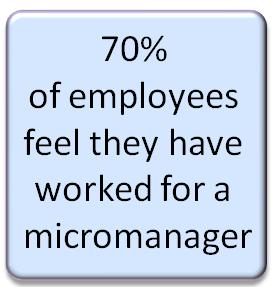Micromanaging’s definition is “to control every part, however small, of an enterprise or activity”. Micromanaging has a stigma associated with it. Most employees hear micromanage and they think of their boss hovering over them and telling them how to do their job. However, this article discusses how micromanaging can be a useful and even a necessary component of an organization’s operations.
First, the negative stigmas associated with micromanaging, which are generally related to employee management. An example would be an employee has been hired because they have the skills necessary for a specific job. A manager feels he has more experience than the employee begins to constantly tell the employee how to do the job. In extreme cases, managers can even take over the employee’s job and ignore manager role. Micromanaging in this form makes the employee feel as if the manager has little faith in their knowledge, skills, and abilities. The reason micromanaging people is so negative is because employees lose motivation. Micromanaging people, in the long run, stops two employees from doing their job, reducing overall productivity.
However, there is a positive side of micromanaging. If you look back at the definition, micromanaging simply means to have control over the company. If a company is not controlled, then it will most likely fail. However, what needs to be highly controlled is not how the employees do the work, but overall operations. Managers need to be constantly looking at the revenues and costs of their sector and making sure they are doing everything possible to control them. For example, it does not matter how talented salespeople handle their leads (Calling many times a week or once a month), as long as the salespeople are keeping their costs down, are making good revenue for the company, and their clients are happy. A company should particularly micromanage costs since they are one of the biggest potential threats to any company’s success. Costs need to be analyzed thoroughly in order to make sure the company is receiving the best bottom line possible.
In conclusion, operational functions should be micromanaged while employees should be given a relative amount of freedom in how to do their jobs successfully. Employees will respond better and want to do more work for a company they feel trusts and respects their ability to do the job. Constantly monitoring the operational functions of the company will ensure that, when there is a problem, the problem will be seen and corrected faster than with a company that loosely manages its operations.




